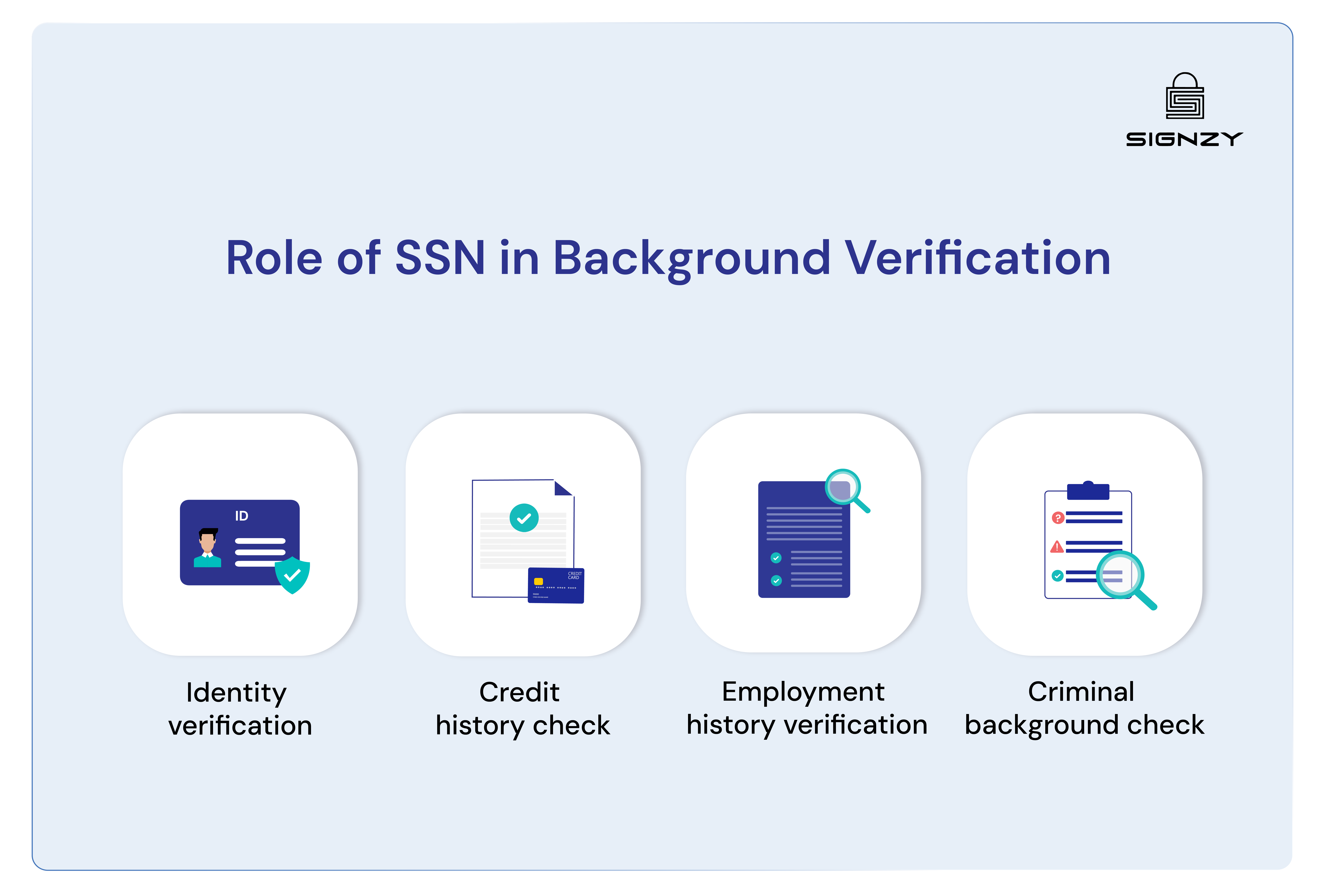What is SSN in Background Verification?
- Role of SSN in Verification: Social Security Numbers (SSNs) are crucial for confirming an individual’s identity and tracking their financial, employment, and criminal history during background checks.
- Key Data Points Unlocked: SSN checks can reveal employment records, credit history, criminal records, and identity fraud risks.
- Fraud Prevention Tool: SSN verification helps businesses detect fake identities, prevent fraud, and comply with regulatory requirements like AML and KYC.
- Compliance & Trust: Accurate SSN verification supports legal compliance, reduces onboarding risk, and builds trust with customers and partners.
In today’s digital and interconnected world, background verification has become a crucial part of many processes, from hiring employees to approving loans. A key component of this verification process, especially in the United States, is the Social Security Number (SSN).
But what exactly is an SSN, and how does it fit into background verification?
Let’s see.
Related Solutions
Understanding Social Security Number (SSN)
The Social Security Number (SSN) is a nine-digit number issued by the Social Security Administration (SSA) to U.S. citizens, permanent residents, and certain temporary residents.
It serves as a unique identifier for individuals within the U.S. social security system, primarily for tracking earnings and benefits.
The Role of SSN in Background Verification

The SSN plays a pivotal role in various aspects of background verification. Here’s how it is typically used:
- Identity Verification: The SSN is a unique identifier that helps verify an individual’s identity. When an SSN is provided during a background check, it allows the verifier to cross-reference the number with government databases, ensuring that the person’s identity matches the information on record.
- Credit History Check: Lenders and financial institutions often use the SSN to access an individual’s credit history. This history includes information about loans, credit cards, payment behavior, and outstanding debts. A clean credit history can be crucial for loan approvals, while red flags in the report may indicate potential financial risks.
- Employment History Verification: Employers use SSNs to verify a candidate’s employment history. By checking the SSN against previous employment records, employers can confirm job titles, dates of employment, and reasons for leaving past jobs. This verification helps ensure that the information provided by the candidate is accurate.
- Criminal Background Check: The SSN is also used to conduct criminal background checks. By searching federal, state, and local criminal databases using the SSN, verifiers can identify any criminal records associated with the individual. This step is important for positions that require a high level of trust and security.
The Importance of SSN in Background Verification
Using the SSN in background verification offers several significant benefits:
- Accuracy: The SSN provides a unique and precise way to verify an individual’s identity and background information. This accuracy is crucial for making informed decisions, whether in hiring, lending, or other scenarios.
- Comprehensiveness: Because the SSN is linked to various databases, it allows for a comprehensive check of an individual’s background. From credit history to criminal records, the SSN helps paint a complete picture of the person’s history.
- Speed: Using the SSN can speed up the background verification process. With direct access to relevant databases, verifiers can quickly obtain the necessary information, reducing the time required for thorough checks.
- Fraud Prevention: By verifying the SSN, organizations can prevent identity theft and fraud. Ensuring that the SSN matches the individual’s provided information helps mitigate risks associated with false identities.
How SSN is Used in Different Background Checks
The SSN is utilized in various types of background checks, each serving a specific purpose:
- Pre-Employment Screening: Employers use SSNs to verify a candidate’s identity, employment history, education, and criminal records. This screening helps employers ensure they are hiring trustworthy and qualified individuals.
- Tenant Screening: Landlords and property managers use SSNs to check potential tenants’ credit history, rental history, and criminal background. This information helps them make informed decisions about renting their properties.
- Loan Application Processing: Lenders use SSNs to assess an applicant’s creditworthiness by reviewing their credit history and financial behavior. This assessment helps lenders determine the risk of extending credit or loans to the applicant.
- Government Benefits Verification: Government agencies use SSNs to verify individuals’ eligibility for various benefits and services. This verification ensures that benefits are provided to the right individuals based on their earnings and social security contributions.
Privacy and Security Concerns
While the SSN is a powerful tool for background verification, it also raises significant privacy and security concerns:
- Risk of Identity Theft: The SSN is a sensitive piece of information that, if stolen, can lead to identity theft. Criminals can use a stolen SSN to open fraudulent accounts, apply for loans, and engage in other illegal activities.
- Data Breaches: Large databases containing SSNs are prime targets for cyberattacks. A breach can expose millions of SSNs, putting individuals at risk of identity theft and financial fraud.
- Legal and Compliance Issues: Organizations must comply with various laws and regulations when handling SSNs, such as the Fair Credit Reporting Act (FCRA) and the General Data Protection Regulation (GDPR). Non-compliance can result in severe penalties and legal consequences.
Best Practices for Handling SSNs
To mitigate risks and protect individuals’ privacy, organizations should follow these best practices when handling SSNs:
- Limit Access: Only authorized personnel should have access to SSNs. Implement strict access controls to ensure that SSNs are handled by individuals with a legitimate need.
- Use Encryption: Encrypt SSNs both in transit and at rest. Encryption helps protect sensitive data from unauthorized access and cyberattacks.
- Secure Storage: Store SSNs in secure, centralized databases with robust security measures. Avoid storing SSNs in unsecured locations, such as spreadsheets or unprotected files.
- Regular Audits: Conduct regular audits to ensure compliance with data protection laws and regulations. Audits can help identify and address potential vulnerabilities in SSN handling processes.
- Employee Training: Train employees on the importance of SSN security and privacy. Educate them on best practices for handling sensitive information and recognizing potential security threats.
💡 Related Blog:
Conclusion
The Social Security Number (SSN) is a cornerstone of background verification processes in the United States. It provides a reliable, accurate, and comprehensive way to verify individuals’ identities, credit histories, employment records, and criminal backgrounds.
But, the use of SSNs also comes with significant privacy and security challenges. By following best practices and implementing robust security measures, organizations can harness the power of SSNs while protecting individuals’ sensitive information.
In a world where trust and security are important, understanding the role of SSNs in background verification is essential for both individuals and organizations. Whether you’re an employer, lender, tenant screener, or government agency, leveraging SSN responsibly can help you make informed decisions and foster a safer, more secure environment for everyone involved.
FAQ
Is SSN verification allowed under U.S. privacy laws like the GLBA or FCRA?
Can I verify an SSN without knowing the full number?
How often should businesses perform SSN verification?

Saurin Parikh
Saurin is a Sales & Growth Leader at Signzy with deep expertise in digital onboarding, KYC/KYB, crypto compliance, and RegTech. With over a decade of professional experience across sales, strategy, and operations, he’s known for driving global expansions, building strategic partnerships, and leading cross-functional teams to scale secure, AI-powered fintech infrastructure.




![10 Best SSN Verification Services: Features Compared [2026]](https://cdn.sanity.io/images/blrzl70g/production/48620bfb8e6520ba651a76bd880b2fd9b5400d1e-1366x320.webp)



![EIN and SSN: 10 Frequently Asked Questions [Business Owner Guide]](https://cdn.sanity.io/images/blrzl70g/production/9bd6d520d6d1d55c3a074dd68b2e9c8071ffe800-2821x663.png)

